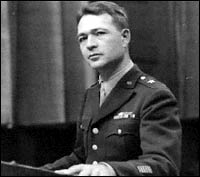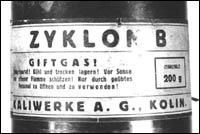Accusing Prominent Businessmen and Professionals
Nearly 200 defendants were charged with crimes against humanity and other war crimes by American prosecutors at the subsequent Nuremberg trials. Among them, Germany's most prominent businessmen and professionals. Prosecutor Telford Taylor, who took over when Justice Robert Jackson returned to the Supreme Court, accused German industrialists of "manufacturing the turbines of war and the tools of holocaust" in their factories.
In his opening statement at the trial of German industrialists, Taylor said: "One does not build a stupendous war machine in a fit of passion. Or an Auschwitz factory during a passing spasm of brutality. There will be no mistaking the ruthless purposefulness with which the defendants marked on the course of conduct. That purpose was to turn the German nation into a military machine and build it into an engine of destruction so terrifyingly formidable that Germany could impose her will and dominion on Europe."

Telford Taylor. Photo: USHMM |
Among the accused were executives from the I.G. Farben company, a huge chemical firm that produced Zyklon-B, the poison gas used to kill millions of Jews at Auschwitz and other Nazi death camps. Farben also ran a synthetic rubber factory at Auschwitz with inmate labor. Carl Krauch, the company's top executive and other Farben managers were tried using the company's own documents which revealed Farben's deep involvement in the Nazi war effort. Historian Jonathan Bush says the Farben employees had a unwavering explanation for the work they did and the papers they signed.
"They said: 'We were made to do it,'" says Bush. "'We would be shot if we didn't.' So in a way they could do jujitsu with all the evidence: 'Yes he signed that, yes he said that…but you're reading it as if he meant it. He didn't mean it. He had to do that to survive.'"
The excuse did not work for Carl Krauch. He was found guilty and sentenced to prison. But of the 24 Farben employees on trial, 11 were acquitted. The judges accepted the defense by some Farben executives who claimed they acted under duress. That helped established a precedent that those who make the policy and give the orders to commit war crimes are more responsible than those who obey the commands.
If the trials were intended as a mirror for Germans to better see Nazi crimes, the Germans themselves didn't like the view. Jonathan Bush says the prosecution of soldiers and industrialists was controversial in Germany and the United States.

The I.G. Farben company produced Zyklon-B, the poison gas used to kill millions of Jews at Auschwitz and other Nazi death camps. Photo: Thomas J. Dodd Papers, Dodd Research Center, University Libraries, University of Connecticut |
"The analogy to many western observers was to Henry Ford," says Bush. "These industrialists— they're successful businessmen, they're doing what their country's laws allow them to do. They are operating within the law, for their country, in a time of war. "
While the trials were meant to provoke soul-searching among the Germans, American prosecutors also knew their work would shape the future of international justice. That preoccupied Benjamin Ferencz, who prosecuted the Nazi death squad members.
"The question I had in my own mind was, "What do I ask for?," says Ferencz. "Do I ask the tribunal to hang them all, chop them up into a million pieces or something like that? I felt, no, that wouldn't really serve a significant purpose because you never could balance their 22 lives against the millions who had been slaughtered. And if I could develop a rule of law that could protect human kind in the future, that would be significant."
Nuremberg would establish a body of jurisprudence that would lay the foundations for what is now understood as human rights—the Genocide and Geneva Conventions—as well as for ad hoc UN tribunals established in the early 1990s and the permanent International Criminal Court. But before the Nuremberg prosecutions were even complete, the court's effectiveness began to erode in a new tide of international politics.
Next: A Tidal Shift in Global Politics 

